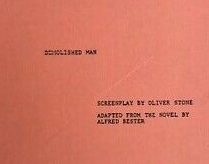 By OLIVER STONE (1980)
By OLIVER STONE (1980)
THE DEMOLISHED MAN by Alfred Bester, initially published in 1951, is one of the most revered science fiction novels of all time. It’s about a corrupt businessman who commits murder in a futuristic milieu policed by telepaths called Espers, and it hasn’t dated terribly well. The “impossible” killing that powers the story is far too easily pulled off (all it takes to outwit the Espers, it turns out, is keeping a repetitive jingle playing continuously in one’s mind) and the things that so impressed 1950s readers, namely the complex personality of the central character (back then characterization of any sort was a rarity in science fiction), no longer seem nearly as impacting.
That didn’t stop a young Oliver Stone from adapting THE DEMOLISHED MAN in this, one of the most famous unfilmed screenplays in existence. Stone is reportedly a huge fan of the novel, and his reverence is evident in a script that hews quite closely to its particulars.
…one of the most famous un-filmed screenplays in existence.
Stone begins his account with an extended dream, sequence—or as is specified in the description, “A BLACK AND WHITE DREAMSCAPE.” This is appropriate, as Stone’s major contribution to the material is a hallucinatory angle. Bester famously conveyed the telepathic landscape through creative typography grouped into circular shapes on the page, which Stone attempted to translate to film via a lot of minutely described psychedelia (POV trips through the insides of peoples’ bodies, overtly expressionistic settings, etc.), as well as subtitled depictions of the thoughts being read. Such are the most interesting things about this script.
Far less edifying are the futuristic details. That Oliver Stone isn’t known for science fiction is evident in the descriptions, which are indistinct and filled with “To be determined” disclaimers, and also the confusing and inconsistent way he delineates the psychic visions and communications of the Espers (with dialogue blocks identified with an “Esper” heading, as in “Esper Reich,” “Esper Powell,” etc.).
The central character is Ben Reich, a 23rd Century business tycoon and, apparently, a distant relative of Gordon Gekko (whose iconic “Greed is Good” speech is echoed in Reich-isms like “Mankind doesn’t help me sleep at night. Profit does” and “power is ethic”). He suffers from nightmares involving a faceless man, while in his waking life he seeks to murder Craye D’Courtney, a business rival. Reich goes through with the killing at a fancy dinner party, outwitting the Espers by, as mentioned above, mentally repeating a musical jingle over and over, and having Tate, an Esper pal, scramble the thoughts of his fellow mind-readers.
The killing appears to go off without a hitch, but Reich’s carefully laid plans are jeopardized by D’Courtney’s daughter Tracy, who witnesses the killing. Further obstacles facing Reich include Police prefect Liz Powell, who figures out fairly quickly that Reich is the guilty party (but can’t immediately prove it), and his own increasingly disordered mental state.
One element that really shines here is Stone’s storytelling flair. He’s crafted a narrative that’s taut and suspenseful despite all the clumsy sci fi detailing, and done so (unusually for a Stone script) without a lot of excess political rhetoric and speech-making.
So what’s the problem? Stone hews too closely to Bester’s source novel (something Brian De Palma’s adaptation of same, written around the same time as this one, avoided), down to the no-longer-twisty “twist” climax and the quintessentially fifties psychological dissertation that follows, as well as the decidedly on-the-nose musical ditty Reich repeats to foil the Espers: “Tension, apprehension and dissention have begun…” Stone’s one major change was switching the gender of Prefect Powell from male to female, which doesn’t ultimately make much of a difference in the story’s unfolding or outcome. In short, Stone didn’t manage to insert nearly enough of himself into this script–something, one assumes, he’d have remedied in subsequent drafts.
